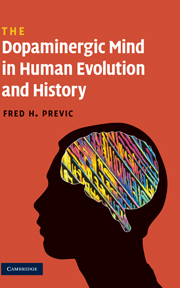Book contents
5 - Evolution of the dopaminergic mind
Published online by Cambridge University Press: 27 July 2009
Summary
It is customary, albeit limiting, to view human brain evolution in terms of the events leading up to genetically and anatomically modern humans, now believed to be approximately 200,000 years ago. All subsequent changes in humans are attributed to the effects of “culture,” and human “history” is relegated to even more modern events beginning with the formation of agricultural societies. If, however, the expansion of dopamine was not due mainly to genetically mediated changes in our neuroanatomy but rather to epigenetic changes in our neurochemistry, then the physical brain evolution of modern humans has continued all the way to the present. This chapter will focus on the evolution of the dopaminergic mind leading up to, and including, the cultural explosion in Homo sapiens that has been termed the “Big Bang” (Mithen, 1996), which occurred first in Southern Africa between 70,000 and 80,000 years ago and later appeared in Europe around 40,000–50,000 years ago, while Chapter 6 will focus on the changes in the dopaminergic mind since the dawn of history. I will highlight two major events in human evolution – the evolution of the “protodopaminergic” mind beginning around two million years ago and the emergence of the later dopaminergic mind with its distinctly human intellectual abilities less than 100,000 years ago. First, however, it is necessary to describe further the contribution of epigenetic influences to inheritance, given the crucial role they appear to have played in our intellectual evolution.
- Type
- Chapter
- Information
- The Dopaminergic Mind in Human Evolution and History , pp. 101 - 122Publisher: Cambridge University PressPrint publication year: 2009



